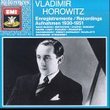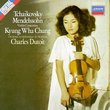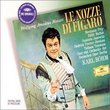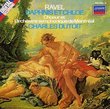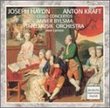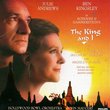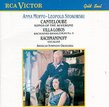| All Artists: Karl Muck, Alfred Hertz, Gotthelf Pistor, Cornelius Bronsgeest, Ludwig Hofmann, Ingeborg Holmgren, Anny Helm, Minnie Ruske-Leopold, Hilde Sinnek, Charlotte Moller, Bayreuth Festival Chorus and Orchestra Title: Wagner: The Complete Karl Muck Parsifal Recordings, Orchestral Suite, etc / Muck Members Wishing: 0 Total Copies: 0 Label: Naxos Original Release Date: 1/1/2013 Re-Release Date: 10/26/1999 Genre: Classical Styles: Opera & Classical Vocal, Historical Periods, Modern, 20th, & 21st Century, Symphonies Number of Discs: 2 SwapaCD Credits: 2 UPC: 636943104927 |
Search - Karl Muck, Alfred Hertz, Gotthelf Pistor :: Wagner: The Complete Karl Muck Parsifal Recordings, Orchestral Suite, etc / Muck
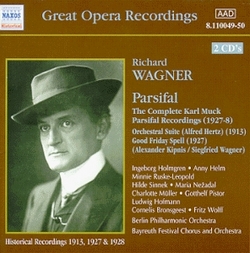 | Karl Muck, Alfred Hertz, Gotthelf Pistor Wagner: The Complete Karl Muck Parsifal Recordings, Orchestral Suite, etc / Muck Genre: Classical
Karl Muck (1859-1940), one of the greatest Wagnerian conductors of the generation immediately following those who knew and worked directly with the master, was responsible for leading the performances of Parsifal at Bayr... more » |
Larger Image |
CD DetailsSynopsis
Amazon.com Karl Muck (1859-1940), one of the greatest Wagnerian conductors of the generation immediately following those who knew and worked directly with the master, was responsible for leading the performances of Parsifal at Bayreuth from 1901 until 1930. Wagner's last opera was, in a word, Muck's property, and this magnificent two-CD set documents his unique and intense relationship with that work in exemplary fashion. It contains Muck's accounts of the Prelude to Act I and a sizable amount of Act III, recorded with the chorus and orchestra of the Berlin State Opera, and of excerpts from Acts I and II, recorded with the chorus and orchestra of the Bayreuth Festival. The recordings, made in 1927 and 1928, reflect the glow of a golden age in Wagner interpretation, and thanks to Naxos's extraordinary job of remastering, that reflection is no longer a dim one. The great Wagnerian soprano Frida Leider, whose voice is not heard on these recordings, encountered Muck in his later years at Bayreuth and was struck by the slowness of his tempos in Parsifal. Indeed, they are slow: the Act I prelude takes 15:55 by the clock and seems even longer, yet the effect is sublime. Muck sustains the prelude as if on a single breath, just at the point where the pulse almost disappears; the music seems to arise out of silence and darkness to become light and spirit. This is just what Wagner intended. The Act III excerpts, which feature tenor Gotthelf Pistor as Parsifal and bass Ludwig Hofmann as Gurnemanz, are also superb. Pistor's is quite a fine voice--he was a real heldentenor--and the drama is palpable. But the greatest treasure here is the playing of the State Opera orchestra. Muck had been its chief conductor for 20 years, from 1892, and the chemistry between him and his erstwhile colleagues is particularly remarkable. They are majestic in the "Good Friday Spell," and they bring enormous grandeur and radiance to the closing pages of the opera. What a superb band this was! The segments recorded in Bayreuth are only a little less enchanting, largely because the chorus preparation leaves a lot to be desired (the chromaticism in Wagner's writing was difficult then, and still is). But we hear the original Bayreuth bells in the Act I transformation music (they were carried up to Berlin for the Act III processional music as well); cast to Wagner's own specifications, and melted down for the German war effort in 1940, they are truly a "voice" from the past. The two discs are superbly laid out, and include, in addition to the Muck material, a four-part orchestral suite from Parsifal conducted by Alfred Hertz and recorded in 1913 with the Berlin Philharmonic, as well as the "Good Friday Spell" played by the Bayreuth Festival Orchestra under the direction of Siegfried Wagner, the composer's son, recorded in 1927. The transfers by Mark Obert-Thorn are the best yet of these historic recordings. --Ted Libbey Similarly Requested CDs
|
CD ReviewsFor the serious Wagner enthusiast, it's indispensable Ray Barnes | Surrey, British Columbia Canada | 01/03/2002 (5 out of 5 stars) "It was a pleasure indeed to hear this set on CD, I purchased Karl Muck's Parsifal Act III excerpts on a Lebendige Vergangenheit (Living History) LP close to 20 years ago. The first transfers from the original 78s were effective and these new transfers have further reduced background hiss and noise. The sound quality in the Alfred Hertz excerpts, made in September, 1913, is significantly worse than all the others, which were done in 1927 and 1928. According to the excellent program notes electrical recording came into use around 1925. It is also noted, and very audible, that the 1882 Bayreuth bells in the Transformation Music are at a significantly lower pitch than the orchestras of the 1920s. The effect remains startling nonetheless.This set is not for everybody, as it contains 3 performances of the Good Friday Music, one of which is purely orchestral, and two accounts of the Act I Prelude. Both CDs play for almost 80 minutes. In general the woodwind and string playing can be heard most clearly, and Gotthelf Pistor's assumption of the title role is strong and clear in spite of the great age of the recording.Artistically, I consider Karl Muck's reading of Parsifal to be peerless. The Act III excerpts are very moving in spite of the constricted sound, and one cannot help but admire the efforts of all the performers, since they were using very short takes for recording onto 78s. I don't think anyone today could take the Good Friday Music and split it into 3 sections, and make it sound on record as if there were no interruptions at all. The contributions by Alfred Hertz and Siegfried Wagner are not quite in the same class, but are also well worth hearing. Overall, at the lowest price range, this cannot be too strongly recommended, even at the risk of duplicating prior releases. A desert island set." Great Wagner Performances at an Unbeatable Price Tom Moran | New York, NY United States | 01/22/2002 (4 out of 5 stars) "Karl Muck was one of the great Wagner conductors, with an uncanny feel for Wagner's music (and a resemblance to the composer that was so uncanny that people thought that he was Wagner's illegitimate son!). Now his recordings of Wagner's final opera are on this 2-CD set from Naxos.Along with the Muck recordings from 1927 and 1928, there are also recordings of music from Parsifal by Siegfried Wagner (the composer's son) and Alfred Hertz (the latter excerpts were recorded in 1913, in the acoustic era, and some sonic allowances should be made for them).But you'll be buying this set (as I hope you will) for the Karl Muck tracks. They are truly amazing. When you consider that he was forced to record this music on 78 R.P.M. records in snippets of three minutes or so, the quality of his performances is astounding. Audio Restoration Engineer Mark Obert-Thorn has done a marvellous job restoring these discs so that they sound as good as they possibly can, and Naxos has put them out at an unbeatable price. If you have any interest in Wagner at all, I would grab this set.One more thing. On the 6th track of the first disc, Muck conducts the Transformation Music for the Grail Scene in Act I. In that scene you hear the bells that Wagner had constructed for the first performances of Parsifal at his own theater at Bayreuth (where these recordings were made). Those bells were later melted down by the Nazis for ammunition during World War II. Listen for them -- they carry you right back to the sound that Wagner must have heard at the premiere." Haunting! Highwayman | Canton, OH | 10/27/2007 (5 out of 5 stars) "Hearing the legendary Bayreuth Bells, subsequently melted down by the Nazi's for cannon fodder, is a truly haunting experience. This is as close as we can get to what Wagner envisioned."
|

 Track Listings (9) - Disc #1
Track Listings (9) - Disc #1